2014
 (Vatican Radio) Pope Francis said there are Christians who are afraid of the joy of Christ’s resurrection and who instead prefer sadness and staying in the shadows just like bats. The importance of Christians being joyful, rather than sad or fearful, was the focus of the Pope's reflections during his homily at Thursday's Mass celebrated in the Santa Marta residence.
(Vatican Radio) Pope Francis said there are Christians who are afraid of the joy of Christ’s resurrection and who instead prefer sadness and staying in the shadows just like bats. The importance of Christians being joyful, rather than sad or fearful, was the focus of the Pope's reflections during his homily at Thursday's Mass celebrated in the Santa Marta residence.Taking his cue from the gospel reading of the risen Christ appearing before his disciples, Pope Francis began by noting how instead of rejoicing over his resurrection, the disciples were struck by fear instead of joy.
“This is a Christian’s disease. We’re afraid of joy. It’s better to think: Yes, yes, God exists, but He is there. Jesus has risen and He is there. Somewhat distant. We’re afraid of being close to Jesus because this gives us joy. And this is why there are so many ‘funeral’ (mournful) Christians, isn’t it? Those whose lives seem to be a perpetual funeral. They prefer sadness to joy. They move about better in the shadows, not in the light of joy, like those animals who only come out at night, not in the light of day, who can’t see anything. Like bats. And with a little sense of humour we can say that there are Christian bats who prefer the shadows to the light of the presence of the Lord.”
But, the Pope continued, Jesus through his resurrection, gives us joy, the joy of being Christians and following him closely, the joy of travelling on the path of the Beatitudes.
“So often, we are either upset by this joy or fearful or we think we have seen a ghost or believe that Jesus is just a way of behaving. ‘We are Christians and so we must behave like this.’ But where is Jesus? ‘No, Jesus is in Heaven.’ Do you talk with Jesus? Do you say to Jesus: ‘I believe that You are alive, that You are risen, that You’re near me. That You will never abandon me’? A Christian life should be this: a dialogue with Jesus, because – this is true – Jesus is always with us, always there alongside us with our problems and our difficulties, with our good works.”
Pope Francis concluded by noting how many times we Christians are not joyful because we are afraid! We’re Christians who have been defeated by the Cross.
“In my country there is a saying that goes like this: ‘When you get burnt by boiling milk, later when you see a cow you start crying.’ These people were burnt by the drama of the Cross and said, ‘No, let’s stop here. He’s in Heaven: that’s all well and good. He is Risen but it’s better that he doesn’t come again because we couldn’t handle it.’ We ask the Lord to do for all of us what he did for the disciples who were afraid of joy: to open our minds: ‘He opened their minds to understand the Scriptures;’ Let him open our minds and help us understand that He is a living reality, that He has a body, that He is with us,that he accompanies us and that He has won. We ask the Lord for the grace to not be afraid of joy.”
Over 200 Killed by Rebels in Massacre in South Sudan - Please Pray
CisaNews Report: BENTIU, April 22, 2014 (CISA) -Rebels slaughtered hundreds of civilians when they seized the South Sudan oil hub of Bentiu, hunting down men, women and children who had sought refuge in a hospital, mosque and Catholic Church, the United Nations told Reuters on Tuesday April 22.
Rebel troops overran Bentiu, the capital of the oil producing Unity State, where more than one million people have fled their homes since fighting erupted in December between troops backing President Salva Kiir and soldiers loyal to his sacked vice-president, Riek Machar.
The fighting has exacerbated ethnic tensions between Mr Kiir’s Dinka people and Mr Machar’s Nuer.
The UN peacekeeping mission in South Sudan said its human rights investigators confirmed that rebels “searched a number of places where hundreds of South Sudanese and foreign civilians had taken refuge and killed hundreds of the civilians after determining their ethnicity or nationality”.
The UN mission strongly condemned the targeted killings on April 15th-16th and the use of Radio Bentiu FM to broadcast hate speech.
While some rebel commanders broadcast calls for unity, “others broadcast hate messages declaring that certain ethnic groups should not stay in Bentiu and even calling on men from one community to commit vengeful sexual violence against women from another community,” the UN said.
At Bentiu hospital, Nuer men, women and children were killed for hiding and not joining other Nuers in cheering the rebels as they entered the town.
People from other South Sudanese communities and from Darfur in Sudan were also killed, the UN said.
Earlier on Sunday April 20 President Salva Kiir had expressed hope that Easter season would mark the end of violence and political confrontations in the country to create chance for peace.
According to Catholic Radio Network, President Kiir told St Theresa Cathedral congregation that Christians would celebrate 2015 Easter peacefully instead of weeping in war as it is in 2014.
He condemned Bor youth for attacking IDPs at UN compound terming it as an ‘irresponsible act by irresponsible people’.
He also condemned road block checkpoints taxing relief workers on their way to conflict affected areas.
President Kiir said several checkpoints taxing aid workers are illegal and must be removed immediately.
He added that officers found blocking roads to relief suppliers and taxing them would severely be punished.
President Kiir refuted international media reports that the conflict in South Sudan has ethnic dimension, insisting that it is a power struggle.
Rebels also entered the Kali-Ballee mosque, a Catholic church and an empty World Food Programme compound where civilians had sought refuge and separated them by nationalities and ethnicities – escorting some to safety and killing others. “More than 200 civilians were reportedly killed and over 400 wounded at the mosque,” the UN said.
Shared from CisaNewsAfrica
RIP Brian Harradine of Australia - State Funeral Homily with Bishop Porteous
Brian Harradine, Australia's longest serving Independent Senator to be given a State Funeral
Catholic Communications, Sydney Archdiocese Release
24 Apr 2014
24 Apr 2014
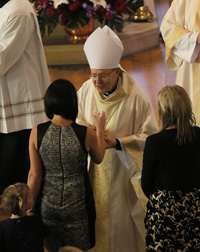
Archbishop Julian Porteous, Archbishop of Hobart celebrated the Mass of Christian Burial for Brian Harradine yesterday
The Most Rev Julian Porteous paid tribute to the late Brian Harradine at the State Funeral for Australia's longest serving Independent senator yesterday, describing him as a "Just Man" who worked tirelessly for the common good, never compromising his integrity or principles.
"The man we have come to bury today can be aptly called a 'just man,'" Archbishop Porteous said in his homily. "He is seen by allies and by those who opposed him as a man who would not go down paths of expediency or compromise in order to achieve his ends. His beliefs were oriented to the good of others. And holding onto these beliefs he would negotiate a way forward whereby the truth of his views was preserved."
Asked by Senator Harradine's family to celebrate the Mass of Christian Burial, Archbishop Porteous spoke of the Tasmanian politician's Catholic faith and how this was the inspiration of what he did and all he achieved.
"He sought to protect the dignity of human life from conception to natural death. Brian Harradine recognised that politics should ultimately not be viewed in terms of parties but instead should recognise its role of service to the community," Archbishop Porteous said. "He did not seek to impose his beliefs but rather allowed his faith it provide the inspiration to his decisions and actions."
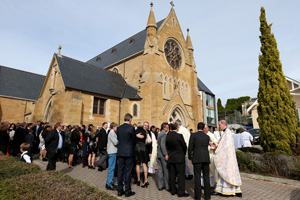
More than 650 family, friends and dignitaries attended the funeral of long serving Senator Brian Harradine in Hobart yesterday
Former Prime Minister John Howard was among more than 650 family, friends, state and federal politicians and local dignitaries who attended yesterday's State Funeral which was held at St Mary's Cathedral in Hobart.
Also there to honour the man affectionately known as the "Father of the Senate" and pay tribute to the 30 years he represented Tasmania as an Independent senator, were Tasmania's Premier Will Hodgman; Governor of Tasmania, His Excellency Peter Underwood AC; the current Leader of the Senate, Senator Eric Abetz; the Federal Minister for Social Services, Kevin Andrews; Senator Stephen Parry; Senator Helen Polly; former Communications Minister Richard Alston; former Speaker of the House, Michael Polley; former Tasmanian Premier, Lara Giddings; Acting Lord Mayor of Hobart, Ron Christie and Brigadier John Withers, representing the Chief of the Defence.
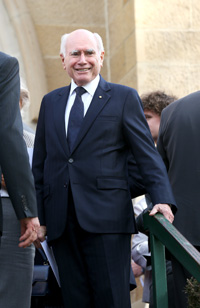
Former Prime Minister John Howard was among past and present Federal and State Politicians at yesterday's State Funeral for Brian Harradine
Among Senator Harradine's close friends who attended the State Funeral yesterday to honour his long life which was lived with generosity, compassion and integrity was well known author, commentator and writer, Melinda Tankard Reist.
"It was such a beautiful send off. Profound," she says and treasures the time she spent time last night reminiscing with Senator Harradine's family, to whom he was devoted.
Senator Harradine who died on 14 April aged 79 after a long illness, is survived by his wife Marian, his 13 children and his many grandchildren.
"He was a man of great integrity," former Prime Minister John Howard told journalists after the State Funeral concluded.
"He agreed with me on some things and supported my government in a very effective way. But on other things we couldn't reach agreement," he said adding that even when agreement could not be reached on a policy or issue, he always liked and respected the Tasmanian Senator for his "great integrity, reliability and honesty."
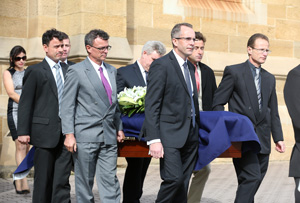
Pallbearers carry the coffin of Australia's longest serving Independent Senator Brian Harradine
"He was a man who could be trusted and who was a fierce negotiator for Tasmania," he said.
Brian Harradine himself listed his two outstanding achievements during his 30 years in Federal Parliament as the $350 million cash deal he obtained for Tasmania which he negotiated in return for his vote for the partial sale of Telstra, and for his role in brokering the Wik native title agreement. The Native Title Amendment Act 1998 was initially to have just six years of life and excluded victims of the Government's locked gates policy and also the Stolen Generation from even claiming native title.
"They wanted to abolish the right to negotiate and I said no to that as well and helped establish a system of Indigenous land use agreements," he would later say.
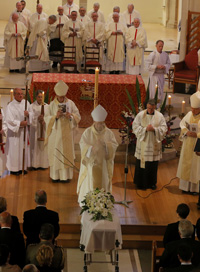
The Most Rev Julian Porteous, Archbishop of Hobart celebrated the Mass of Christian Burial for Senator Brian Harradine yesterday
But of all those paying tribute to Brian Harradine in wake of his passing, Archbishop Porteous in his homily perhaps summed up the essence of the man and his achievements best.
"There are two particular aspects to the character of a just man that deserve mention. The first is that such a man is humble. Brian never sought personal advancement. He shunned personality politics. He was always content to be in the background. He never claimed the limelight or sought to gain credit for what he achieved. He never wanted fuss and probably would think today is over the top," he said, adding that "humility is the mark of a just man."
Archbishop Porteous then went on to explain that a just man sees his life essentially as service.
"This is how Brian Harradine went about his life in politics. He sought to assist the needs of the poor and struggling. He defended the sacredness of human life, speaking out for those who could not speak for themselves - the children in the womb. He dedicated his work as an Independent senator to the advancement of the State of Tasmania and ensured that this island state benefited from its rightful place in the Commonwealth."
Archbishop Porteous concluded his homily saying: "May we be inspired by his example to become just men and women ourselves."
Shared from Archdiocese of Sydney
Pope Francis meets Prime Minister of Albania Edi Rama and his wife
 (Vatican Radio) Pope Francis met on Thursday with the Albanian Prime Minister Edi Rama and his wife in the library of the Apostolic Palace. According to a statement from the Holy See press office, the two men discussed relations between church and state in Albania, as well as dialogue between the different faith communities and the contribution Catholics can make to the common good of the former Communist country.
(Vatican Radio) Pope Francis met on Thursday with the Albanian Prime Minister Edi Rama and his wife in the library of the Apostolic Palace. According to a statement from the Holy See press office, the two men discussed relations between church and state in Albania, as well as dialogue between the different faith communities and the contribution Catholics can make to the common good of the former Communist country.Catholics number just over ten percent of the population in the predominantly Muslim nation, with the Orthodox Church making up the third largest religious community. During the meeting the Pope and the Prime Minister also spoke about issues facing the Balkan region and about Albania’s progress towards integration in the European Union
At the end of the 20 minute meeting Pope Francis gave a special blessing to the Prime Minister’s wife who is currently expecting a baby. Speaking to Vatican Radio after the audience, the Albanian leader said it was a very moving moment for the couple when the Holy Father laid his hand on his wife’s stomach to bless their unborn child.
Please find below the English translation of the statement from the Holy See press office:
On the morning of Thursday 24 April 2014 the Holy Father Francis received in Audience,
in the Vatican Apostolic Palace, the Prime Minister of the Republic of Albania, His Excellency
Mr. Edi Rama, who subsequently met with Cardinal Secretary of State Pietro Parolin,
accompanied by Archbishop Dominique Mamberti, Secretary for Relations with States.
During the cordial discussions, the Parties remarked upon the good relations between the
Holy See and the Republic of Albania, and focused on themes of common interest regarding the
relations between the ecclesial and civil communities, including interreligious dialogue and the
contribution of the Church to the common good of Albanian society.
Attention then turned to the principal regional issues and Albania’s progress towards full
integration within the European Union.
Text from Vatican Radio website
Young Christian Girl Age 7 Raped by Gang in Pakistan - Father is kidnapped - Please Pray
Asia News IT Report: by Jibran Khan
Sara was raped by four men in a Muslim village in Sialkot . The little girl is hospitalized in a "critical condition". The rapists kidnapped her father, Iqbal Masih, forcing the family to not press charges. Activists and human rights organizations demand justice.

Islamabad (AsiaNews ) - A "clan" of four Muslim men raped a Christian girl of only seven years old, named Sara yesterday in the village of Mally ki, Daska, Sialkot district (Punjab) . The child is now in Sialkot hospital, in the intensive care unit in a "critical" condition according to doctors. Meanwhile, the police, instead of arresting the culprits, helped the local clan to kidnap the girl's father; Iqbal Masih was taken and hidden in a secret place to "force the family not to report the story, to reach an agreement with the criminals and to avoid a dispute of a religious background".
The Christian community has attempted every possible means to negotiate with police, with no success. The police seem reluctant to punish the rapists and free Masih, in the hands of the torturers who abused daughter.
Activists and human rights organizations demand justice and ensure their support for the family. Following repeated appeals and pressures, the judiciary has opened an investigation and ordered the arrest of two people involved in the rape; however so far there is no news of her father's fate.
According to recent research, the cases of sexual abuse and violence - especially against young Christian girls - are on the rise in the province of Punjab, under the complicit silence of the police and the judicial authorities. Father John Arshad, a priest involved in the protection of minority rights, condemns the sexual assault on a girl of only seven years and the kidnapping of the parent, "to put pressure on the family not to report the crime". The "silence" of civil society, he adds, heightens the drama of the story even more.
With a population of more than 180 million people (97 per cent Muslim), Pakistan is the sixth most populous country in the world, the second largest Muslim nation after Indonesia. About 80 per cent of Muslims are Sunni, whilst Shias are 20 per cent. Hindus are 1.85 per cent, followed by Christians (1.6 per cent) and Sikhs (0.04 per cent). Violence against ethnic and religious minorities is commonplace across the country, with Shia Muslims and Christians as the main target, with things getting worse. Dozens episodes , including targeted attacks against entire communities - such as in Gojra in 2009 or Joseph Colony Lahore last year - or abuses against individuals (Asia Bibi , Rimsha Masih or the young Robert Fanish Masih, who also died in his cell), are often perpetrated under the pretext of the blasphemy laws .
Shared From Asia News IT
Sara was raped by four men in a Muslim village in Sialkot . The little girl is hospitalized in a "critical condition". The rapists kidnapped her father, Iqbal Masih, forcing the family to not press charges. Activists and human rights organizations demand justice.

Islamabad (AsiaNews ) - A "clan" of four Muslim men raped a Christian girl of only seven years old, named Sara yesterday in the village of Mally ki, Daska, Sialkot district (Punjab) . The child is now in Sialkot hospital, in the intensive care unit in a "critical" condition according to doctors. Meanwhile, the police, instead of arresting the culprits, helped the local clan to kidnap the girl's father; Iqbal Masih was taken and hidden in a secret place to "force the family not to report the story, to reach an agreement with the criminals and to avoid a dispute of a religious background".
The Christian community has attempted every possible means to negotiate with police, with no success. The police seem reluctant to punish the rapists and free Masih, in the hands of the torturers who abused daughter.
Activists and human rights organizations demand justice and ensure their support for the family. Following repeated appeals and pressures, the judiciary has opened an investigation and ordered the arrest of two people involved in the rape; however so far there is no news of her father's fate.
According to recent research, the cases of sexual abuse and violence - especially against young Christian girls - are on the rise in the province of Punjab, under the complicit silence of the police and the judicial authorities. Father John Arshad, a priest involved in the protection of minority rights, condemns the sexual assault on a girl of only seven years and the kidnapping of the parent, "to put pressure on the family not to report the crime". The "silence" of civil society, he adds, heightens the drama of the story even more.
With a population of more than 180 million people (97 per cent Muslim), Pakistan is the sixth most populous country in the world, the second largest Muslim nation after Indonesia. About 80 per cent of Muslims are Sunni, whilst Shias are 20 per cent. Hindus are 1.85 per cent, followed by Christians (1.6 per cent) and Sikhs (0.04 per cent). Violence against ethnic and religious minorities is commonplace across the country, with Shia Muslims and Christians as the main target, with things getting worse. Dozens episodes , including targeted attacks against entire communities - such as in Gojra in 2009 or Joseph Colony Lahore last year - or abuses against individuals (Asia Bibi , Rimsha Masih or the young Robert Fanish Masih, who also died in his cell), are often perpetrated under the pretext of the blasphemy laws .
Shared From Asia News IT
Vatican Official Explains Pope Francis' Phone Call to Divorced Woman
(Vatican Radio) The director of the Holy See Press Office, Fr Federico Lombardi, has responded to widespread media reports about an Argentinian woman who says that Pope Francis called to tell her she could take Communion, even though her husband is divorced and they have not been married in church.
News stories earlier this week ran conflicting reports about the woman, Jacquelina Lisbona, who had written to the Pope several months ago after being denied Communion by her parish priest. According to the reports, Fr Bergoglio, as he called himself, picked up the phone to respond to her letter on Monday and told her the Church was in the process of dealing with the issue of Communion for divorced and remarried Catholics.
In his brief remarks on Thursday, Fr Lombardi said such conversations should be seen in the context of the Pope’s “personal pastoral relationships” and not as an event that carries “consequences relating to the teaching of the Church”.
Below please find the English language translation of Fr Lombardi’s remarks:
Several telephone calls have taken place in the context of Pope Francis’ personal pastoral
relationships.
Since they do not in any way form part of the Pope's public activities, no information or
comments are to be expected from the Holy See Press Office.
That which has been communicated in relation to this matter, outside the scope of personal
relationships, and the consequent media amplification, cannot be confirmed as reliable, and is
a source of misunderstanding and confusion.
Therefore, consequences relating to the teaching of the Church are not to be inferred from
these occurrences.
Text from Vatican Radio website
News stories earlier this week ran conflicting reports about the woman, Jacquelina Lisbona, who had written to the Pope several months ago after being denied Communion by her parish priest. According to the reports, Fr Bergoglio, as he called himself, picked up the phone to respond to her letter on Monday and told her the Church was in the process of dealing with the issue of Communion for divorced and remarried Catholics.
In his brief remarks on Thursday, Fr Lombardi said such conversations should be seen in the context of the Pope’s “personal pastoral relationships” and not as an event that carries “consequences relating to the teaching of the Church”.
Below please find the English language translation of Fr Lombardi’s remarks:
Several telephone calls have taken place in the context of Pope Francis’ personal pastoral
relationships.
Since they do not in any way form part of the Pope's public activities, no information or
comments are to be expected from the Holy See Press Office.
That which has been communicated in relation to this matter, outside the scope of personal
relationships, and the consequent media amplification, cannot be confirmed as reliable, and is
a source of misunderstanding and confusion.
Therefore, consequences relating to the teaching of the Church are not to be inferred from
these occurrences.
Text from Vatican Radio website
Saint April 24 St. Fidelis of Sigmaringen - Patron of Travelers
St. Fidelis of Sigmaringen
MARTYR
Feast: April 24
 Information:
|
He was born in 1577, at Sigmarengen, a town in Germany, in the principality of Hoinvenzollen. The name of his father was John Rey. The saint was christened Mark, performed his studies in the university of Fribourg in Switzerland, and while he taught philosophy, commenced doctor of laws. He at that time never drank wine, and wore a hair-shirt. His modesty, meekness, chastity, and all other virtues, charmed all that had the happiness of his acquaintance. In 1604, he accompanied three young gentlemen of that country on their travels through the principal parts of Europe. During six years, which he continued in this employment, he never ceased to instil into them the most heroic and tender sentiments of piety. He received the holy sacrament very frequently, particularly on all the principal holidays: in every town where he came, he visited the hospitals and churches, passed several hours on his knees in the presence of the blessed sacrament, and gave to the poor sometimes the very clothes off his back. After this he practiced the law in quality of counsellor or advocate, at Colmar, in Alsace, with great reputation, but with greater virtue. Justice and religion directed all his actions. He scrupulously forbore all invectives, detractions, and whatever might affect the reputation of any adversary. His charity procured him the surname of counsellor and advocate for the poor: but the injustices of a colleague in protracting lawsuits for gain, and his finding fault with our saint for producing all his proofs for his clients in the beginning, in order to the quicker dispatch, gave him a disgust of a profession which was to many an occasion of sin, and determined him to enter among the Capuchin friars. He first received holy orders, and having said his first mass in their convent at Fribourg, on the feast of St. Francis, in 1612, he consecrated himself to God by taking the habit. The guardian gave him, in religion, the name of Fidelis, or Faithful, alluding to that text of the Apocalypse which promises a crown of life to him who shall continue faithful to the end. From that moment humiliations, macerations, and implicit obedience were his delight. He overcame temptations by discovering them to his director, and submitting to his advice with regard to his conduct under them. By his last will, he bequeathed his patrimony to the bishop's seminary, for the establishment of a fund for the support of poor students, to whom he also left his library; and gave the remainder of his substance to the poor.
In regard to dress and furniture, he always chose that for his own use which was the least valuable and convenient. He fasted Advent, Lent, and Vigils, on bread and water, with dried fruits, tasting nothing which had been dressed by fire. His life was a continued prayer and recollection, and at his devotions he seemed rather like an angel than a man. His earnest and perpetual petition to God was, that he would always preserve him from sin, and from falling into tepidity or sloth in his service. He sought the most abject and most painful employments even when superior; knowing that God exalts those highest who have here humbled themselves the lowest and the nearest to their own nothingness. He had no sooner finished his course of theology, than he was employed in preaching and in hearing confessions; and being sent superior to the convent of Weltkirchen, that town and many neighboring places were totally reformed by his zealous labors, and several Calvinists converted. The congregation de propaganda fide, sent to father Fidelis a commission to go and preach among the Grisons; and he was the first missionary that was sent into those parts after that people had embraced Calvinism. Eight other fathers of his order were his assistants, and labored in this mission under his direction. The Calvinists of that territory, being incensed at his attempt, loudly threatened his life, and he prepared himself for martyrdom on entering upon this new harvest. Ralph de Salis, and another Calvinist gentleman, were converted by his first conferences. The missionary penetrated into Pretigout, a small district of the Grisons, in 1622, on the feast of the Epiphany, and gained every day new conquests to Christ; the conversion of which souls ought to be regarded as more the fruit of the ardent prayers in which he passed great part of the nights, than of his sermons and conferences in the day. These wonderful effects of his apostolic zeal, whereof the bishop of Coire sent a large and full account to the congregation de propaganda, so enraged the Calvinists in that province, who had lately rebelled against the emperor. their sovereign, that they were determined to bear with them no longer. 'The holy father having notice of it, thought of nothing but preparing himself for his conflict, passing whole nights in fervent prayer before the blessed sacrament, or before his crucifix, and often prostrate on the ground. On the 24th of April, 1622, he made his confession to his companion with great compunction, said mass, and then preached at Gruch, a considerable borough. At the end of his sermon, which he delivered with more than ordinary fire, he stood silent on a sudden, with his eyes fixed on heaven, in an ecstasy, during some time. He foretold his death to several persons in the clearest terms, and subscribed his last letters in this manner: "Brother Fidelis, who will be shortly the food of worms." From Gruch he went to preach at Sevis, where, with great energy, he exhorted the Catholics to constancy in the faith. A Calvinist having discharged his musket at him in the church, the Catholics entreated him to leave the place. He answered, that death was his gain and his joy, and that he was ready to lay down his life in God's cause. On his road back to Gruch, he met twenty Calvinist soldiers with a minister at their head. They called him false prophet, and urged him to embrace their sect. He answered: "I am sent to you to confute, not to embrace your heresy. The Catholic religion is the faith of all ages, I fear not death." One of them beat him down to the ground by a stroke on the head with his backsword. The martyr rose again on his knees, and stretching out his arms in the form of a cross, said with a feeble voice "Pardon my enemies, O Lord: blinded by passion they know not what they do. Lord Jesus, have pity on me. Mary, mother of Jesus, assist me." Another stroke clove his skull, and he fell to the ground and lay wetering in his blood. The soldiers, not content with this, added many stabs in his body, and hacked his left leg, as they said, to punish him for his many journeys into those parts to preach to them. A Catholic woman lay concealed near the place during this butchery; and after the soldiers were gone, coming out to see the effects of it, found the martyr's eyes open, and fixed on the heavens. He died in 1622, the forty-fifth year of his age, and the tenth of his religious profession. He was buried by the Catholics the next day. The rebels were soon after defeated by the imperialists, an event which the martyr had foretold them. The minister was converted by this circumstance, and made a public abjuration of his heresy. After six months, the martyr's body was found incorrupt, but the head and left arm separate from the trunk. These being put into two cases, were translated from thence to the cathedral of Coire, at the earnest suit of the bishop, and laid under the high altar with great pomp; the remainder of the corpse was deposited in the Capuchin's church at Weltkirchen. Three miracles performed by his relics and intercession, out of three hundred and five produced, are inserted in the decree of his beatification, published by pope Benedict XIII., in 1729. Other miracles were proved, and the decree of his canonization was published by Benedict XIV., in 1746. The 24th of April is appointed the day of his festival, and his name is inserted in the Roman Martyrology. See the acts of his canonization: also his life, written by Dom. Placid, abbot of Weissenau, or Augia Brigantina, published by Dom. Bernard Pez, librarian in the famous abbey of Melch, in Austria, in his Bibliotheca Ascetica, t. 10, p. 403.
To contribute to the conversion of a soul from sin is something far more excellent than to raise a dead body to life. This must soon fall again a prey to death; and only recovers by such a miracle the enjoyment of the frail and empty goods of this world. But the soul which, from the death of sin, is raised to the life of grace, is immortal, and, from a slave of the devil and a firebrand of hell, passes to the inestimable dignity and privileges of a child of' God; by which divine adoption she is rescued out of the abyss of infinite misery, and exalted to the most sublime state of glory and happiness, in which all the treasures of grace and of heaven are her portion forever. Hunger, thirst, watchings, labors, and a thousand martyrdoms, ought to seem nothing to one employed in the sacred ministry, with the hopes of gaining but one sinner to Christ. Moreover, God himself will be his recompense, who is witness, and keeps a faithful account of all his fatigues and least sufferings.
|
source: http://www.ewtn.com/saintsHoly/saints/F/stfidelisofsigmaringen.asp#ixzz1sz6IyiSh


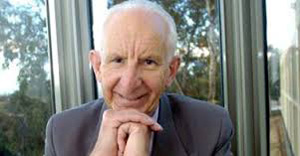

No comments:
Post a Comment